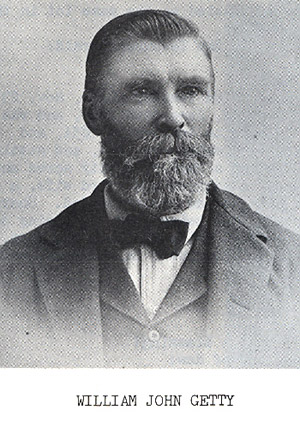 WILLIAM JOHN GETTY, the
oldest child of James and Matilda Getty, was
born in County Antrim, Ireland, May 14,
1832. His baptism record was not found at
either the Craigs Parish Church or at the
Presbyterian Church at Cullybackey, as were
some of the younger children, so the family
may have lived in a neighboring parish at
this time.
WILLIAM JOHN GETTY, the
oldest child of James and Matilda Getty, was
born in County Antrim, Ireland, May 14,
1832. His baptism record was not found at
either the Craigs Parish Church or at the
Presbyterian Church at Cullybackey, as were
some of the younger children, so the family
may have lived in a neighboring parish at
this time.
In 1848, at the age of
16, Will came to the United States, landing
in New York. While in York State, he taught
public school, and studied medicine for
three years. In 1852 he returned to Ireland
to escort his mother, sisters and brothers
to America. His father had come over the
previous fall. In 1853 he left New York and
headed west to Michigan. He looked up
Leticia Neeley, daughter of old family
friends, and the day after Christmas, December 26,
1853, they were married in the Presbyterian
Manse in Tecumseh. Will was 21 years old,
and Leticia was 18.
Will wasn't sure if he
wanted to settle in Michigan, so he and his
bride went to Indiana, where he learned the
blacksmith trade. They lived in
Millersburg, Noble County, for about a
year. His various occupations were repairing
railroad bridges, keeping a boarding house,
and dealing in logs and lumber. Emeline
Elizabeth may have been born during their
sojourn in Indiana. No birth record was
found. They returned to Michigan and Will
set up a blacksmith shop in Ridgeway.
In April of 1861, when
war broke out between the states, Will
enlisted at Monroe, Michigan, in the 1st.
Michigan Cavalry as a trooper and a
veterinarian. The first enlistment was for
three months as it was thought that the
rebellion could be defeated in that time.
The 1st. Michigan Cavalry was organized by
George Custer. This unit moved into Ohio to
come under the command of General Phil
Sheridan. Sheridan used the 1st. Michigan to
form two units: the 1st. and 3rd. Michigan
Cavalry. William found himself in the 3rd.
Michigan which was ordered to Washington,
D.C., where it was immediately used to
confront the confederate forces in the first
battle of Bull Run.
 This ended in a rout of
the Union Army and loss of all records,
supplies and equipment. In the process, Will
was wounded and was sent back to Tecumseh to
recover. He had joined the cavalry because
of his love of horses and of his knowledge
as a veterinarian. The terrific slaughter of
horses in battle turned him against the
cavalry, so he reenlisted in the
6th. Michigan Infantry and was allowed time
for his three months enlistment plus his
recovery time. This unit, under Gen. Buell,
served in the campaigns of Memphis,
Chattanooga, Murfreesboro, Chicamauga and
south.
This ended in a rout of
the Union Army and loss of all records,
supplies and equipment. In the process, Will
was wounded and was sent back to Tecumseh to
recover. He had joined the cavalry because
of his love of horses and of his knowledge
as a veterinarian. The terrific slaughter of
horses in battle turned him against the
cavalry, so he reenlisted in the
6th. Michigan Infantry and was allowed time
for his three months enlistment plus his
recovery time. This unit, under Gen. Buell,
served in the campaigns of Memphis,
Chattanooga, Murfreesboro, Chicamauga and
south.
At the end of the 6th
Michigan Infantry's term of service the
veterans petitioned to reactivate it. The
petition was granted but was reinstated as
the 6th. Michigan Heavy Artillery and was
assigned to Major General E. R. S. Canby in
the Mississippi River Campaign.
The last battle of any
magnitude fought in the war was at Mobile,
Alabama, where the 6th. Michigan was used to
reduce Fort Morgan on Mobile Point and Fort
Gaines which defended the entrance to Mobile
Bay. The 6th Michigan Heavy Artillery
mustered out on August 20, 1865, in New
Orleans.
In April 1861, William
John Getty was described as 29 years old, 5
ft. 9 in. tall, blue eyes, sandy hair and
light complexion. In August 1865 he mustered
out with an identical description as being
29 years old, which indicates his record had
been continued since 1861. This may have
been the reason why his birth date was 1835
in his obituary instead of 1832. The three
year error in his age stuck with him for the
rest of his life.
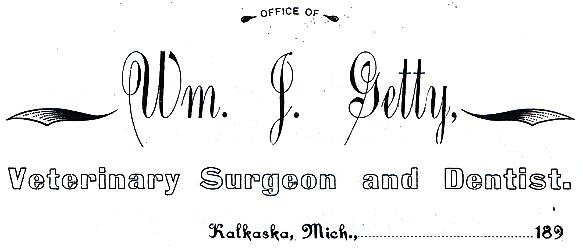
While William was home
in Tecumseh just before the Mississippi
River Campaign, Leticia became pregnant for
their second child. When he came home from
the war in August of 1865, his wife and baby
were dead. They both died July 26, 1864,
when the infant was 18 days old. They are
buried on the Neeley lot in the tiny North
Adrian Cemetery on Shepherd Road.
Right after the Civil
War, William worked for a short time on the
Union Pacific Railroad. He was in charge of
a Chinese Coolie work gang.
 On October 16, 1866, in
Adrian, Michigan, Will took for his second
wife, Adeline B. Baird, formerly of Vermont.
They were married by the Rev. John T.
Staunton, in Christ Episcopal Church in
Adrian. The witnesses were William and Eliza
J. Underwood. In November of the same year,
they moved north, locating in the wilderness
of Antrim County.
On October 16, 1866, in
Adrian, Michigan, Will took for his second
wife, Adeline B. Baird, formerly of Vermont.
They were married by the Rev. John T.
Staunton, in Christ Episcopal Church in
Adrian. The witnesses were William and Eliza
J. Underwood. In November of the same year,
they moved north, locating in the wilderness
of Antrim County.
It was strange country,
and they stayed with friends until they were
able to take up temporary quarters in Helena
Township, near Clam Lake. William filed for
homestead on the NE fractional 1 of Section
4, T. JO N. of R. 8 W. and it was near Clam
Lake (Helena Township) that their first
child, George Baird Getty, was born in 1867.
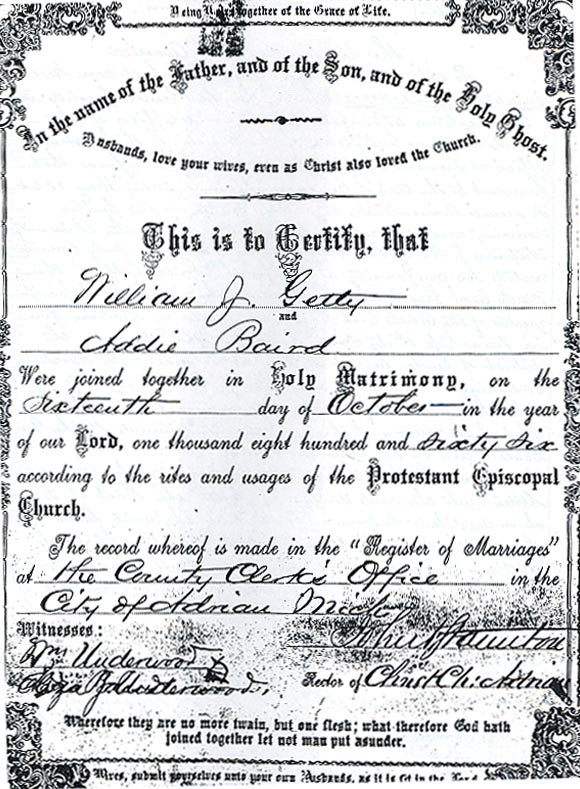
At the end of the
township survey notes it describes section 4
as having the best soil with numerous
springs and small water courses. The new
settlers that had some knowledge of land and
soil looked to the type of trees that were
growing there. Hardwoods required good soil
while
 the pines grew on rather sandy
infertile soils. William must have known
this, as he picked land that had sugar
maple, beech and elm growing on it, all
indicating rich soil, but the best
indication of all was the basswood which
requires the richest soil of all.
the pines grew on rather sandy
infertile soils. William must have known
this, as he picked land that had sugar
maple, beech and elm growing on it, all
indicating rich soil, but the best
indication of all was the basswood which
requires the richest soil of all.
Part of
the homestead, however, was in a big stand
of virgin pine which had to be cleared.
There was no indication on the surveys of
any habitation or trails or anything on the
original plats of the entire west side of
Antrim County. The two original patents
granting to William the land which became
their homestead were granted by President
Grant on October 6, 1874.
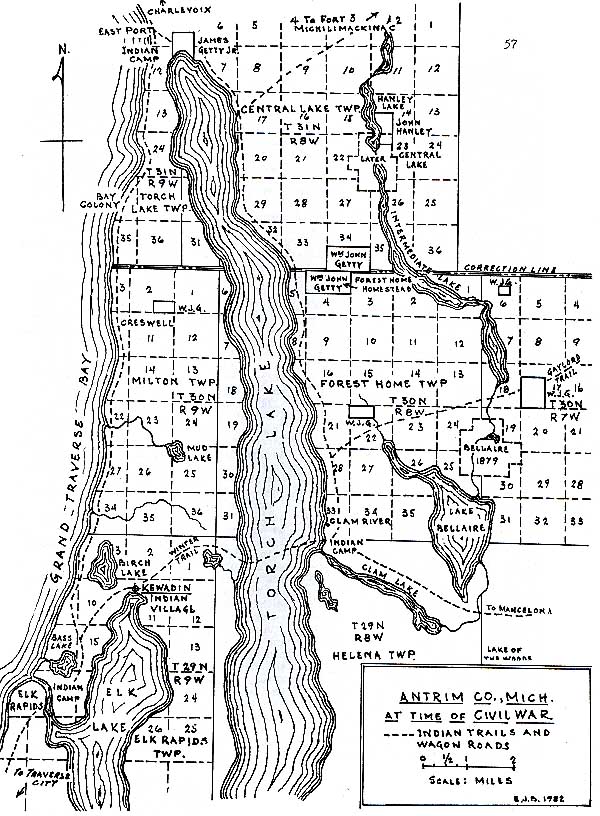
Shortly after their
first child was born, the family moved to
the new homestead to "prove up" and they
named it Forest Home. This later became
Forest Home Township. At that time the main
routes of travel were over old Indian
trails, one of which went to Old Fort
Michilimackinac. The main source of supplies
came in by boat to Elk Rapids and had to be
packed in from there.
William filled in his
ownership around the homestead until he had
more than a full section of land at least
671 acres all told, half of which was in
Forest
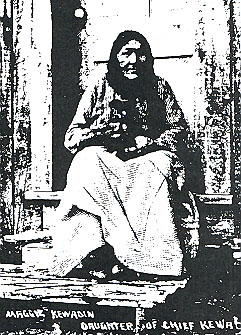 Home Township and half in Central
Lake Township. Central Lake Township was
where his brother, James, Jr., took out
Homestead in 1865, and John Hanley, Will's
son-in-law, later homesteaded on land that
became part of the town site of Central
Lake. Because Will owned land in both
townships, he could take an active part in
each. He had a hand in laying
out the original town sites of Bellaire and
Central Lake.
Home Township and half in Central
Lake Township. Central Lake Township was
where his brother, James, Jr., took out
Homestead in 1865, and John Hanley, Will's
son-in-law, later homesteaded on land that
became part of the town site of Central
Lake. Because Will owned land in both
townships, he could take an active part in
each. He had a hand in laying
out the original town sites of Bellaire and
Central Lake.
There were many Indians in the
area that were associated with the Ottawas
and Algonquins. Kewadin was an Indian
village on the north end of Elk Lake. The
last chief, Kewadin, left a daughter,
Maggie, who had been born in Fort
Michilimackinac when it was held by the
French. At the time the Getty family
homesteaded in Antrim County, Maggie was
getting old, and she was taken in and cared
for by them. William always had a houseful,
as there was always someone that needed
help. They thought she might have been an
Algonquin. She spoke only a very little
broken pigeon French, interspersed with
Indian dialect and a lot of cuss words. The
Gettys tried to figure out what her name was
and settled for calling her "Old Missus". In
time they put together her story that she
had been a young girl at the French fort of
Michilimackinac and had experienced the
fighting between the French and English,
and had witnessed a massacre there during
the French and Indian War. From those
dates, it appeared that she must have been
at least 110 years old.
Maggie was very quiet
but observed everything and was a perfect
mimic. She spent most of the summer days on
the front "stoop" in a rocking chair fanning
herself.
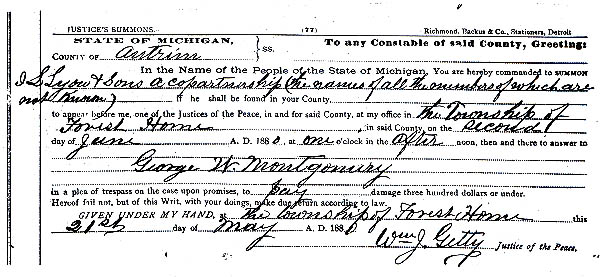
The following is a
letter to James Getty from October 31, 1875.
I have typed most of it because his son,
William Getty, dated it is very difficult to
read.
 |
|
As I am growing anxious
to hear from you and to hear how you are
getting along with your divorce case, I take
this opportunity of writing you a few lines.
I should have written
you some time since But as Charley was going
home I knew you would hear all the news
Therefore have been more negligent. I was in
Tecumseh on the next Monday after I left
you there in hopes that you had returned and
I might see you once
more before I left but you had not returned
yet and I did not see you. Would liked to
have done so as I did not see you at the
time you started. Charlie made but a short
stay in the north this time and did not
create a very good impression while here on
account of his aversion to labor. (Said he
would go home cod up the gent and could live
easy with him this winter!) He also said he
would tell you that I cheated him in trade
and would try to put you against me. The
fact is he was trying to trade with some one
all the time and I refused to trade with him
many times when it would have been to my
advantage to trade as I did not want to
take advantage of him.
I made but one trade with him, gave
him my watch my revolver and five dollars in
cash for his watch which was equal to 2.5$
cash and you can buy a new watch today of
the same Stamp for $22. I bought his old
horse when he got him to Detroit and gave
him $30 for him, have been
at expense of shipping him home about 10
Dollars and I could not sell him for 23$
today. I paid him fifteen Dollars for one
month and one weeks work let him work when
and where he was a mind to and never asked
him to work with my other
hired hands.
All he done during the time he
was with me would not pay for his Board one
half of the time he was with me And he told
around that he would get just as much pay
and
as much thanks as though he worked hard this
is matter that I do not like to refer to nor
should I but I did not know what kind of a story he
might tell and I thought I would give you my
version of the whole matter and perhaps put
you on your guard for I am sure he is more
able to work than you are. I should never
have thought of Charlie being so deceitful
myself had not his confidents informed me of
the matter since he went home.
Getting quite
a snow storm here at present the first of
the season but I think we will have fine
weather soon. I have got my work about all
done and am about ready for winter have
sold off all my young stock of cattle have
only left one cow and 2 yearling
heifers but have bought young colts in their
place. I have got 2 yearling colts & 4
spring colts all nice thrifty colts which I
am going to take care of myself this winter.
I am not intending to
do much business this winter have plenty of
feed for what stock I have and I think I
will try to take it easy this winter and
only try to keep even with the world this
winter and let the folks in the house have a
little rest. I have now got 50 acres clear
and have five more paid for to be ready for
wheat next fall. I shall not now try to
clear more than I can clear without
interfering with my business but will make
what I have cleared clear up what more I may
want to clear.
Old Mr. Underwood and
Mr. Updike made us quite a visit recently
which I enjoyed very much both having had
much experience in pioneer life and from
whom I gleaned many practical hints which I
esteem very highly and which may be of value
to me in my progress as a pioneer.
Mrs.
Underwood and Mrs. Pilbeam were also in the
company and were very interesting guests but
in doing the talking the ladies took back
seats and could only get a word in edgeways
when provoked to do so. Mr. Updike generally
had the floor his full share of the time and
never seemed ready to wind up until really
compelled to and then only for a short time.
But his gas has all degenerated into
something sensible and one does not get
tired listening to him hope he will come
again when Mr. and Mrs. Underwood comes to
make me another visit.
James has got back on
his own place seemingly satisfied that a
city life is not so lucrative after all. I
guess he managed to live and that was all he
has no stock or anything left to start
farming and it will go slow for a while but
James will never be a farmer he does not
like to work for himself he wants to' hire
all his own work done and work out himself
to pay for it.
His family is all well. They
have just left here now with a load of
chickens for a new start. Our potato crop is
not as good as usual this season but we have
plenty for our own use the corn crop was
rather poor on account of early frost. I
sowed about 5 acres of fall wheat but it has not got much
of a start yet. I have 5 good hogs for my
own use and I killed a beef the other day so
there is a prospect of our having enough to
eat this winter if nothing unforeseen
happens to prevent.
I want you to write me
a good long letter when you get this. Tell
me how you got along going on your visit the
time you left me in Tecumseh and what kind
of a time you had & tell me how you are
getting along with your suit with Rosey in
fine, tell me all the news of interest tell
me how you are getting along financially.
I
would advise you as soon as you can to sell
off some of your land and take some comfort
while you can. No one will thank you for
making a slave of yourself and living in
seclusion to save your property. Take and
enjoy the comforts of life while you may
and enjoy the fruits of your own hard toil
is my advice.
Very Truly and
affectionately your Son
William J. Getty
|
|
 |
Maggie Kewadin came
with the Getty family to Kalkaska, and spent
her remaining days in their home. When she
died she was buried on their lot in the
Evergreen Cemetery.
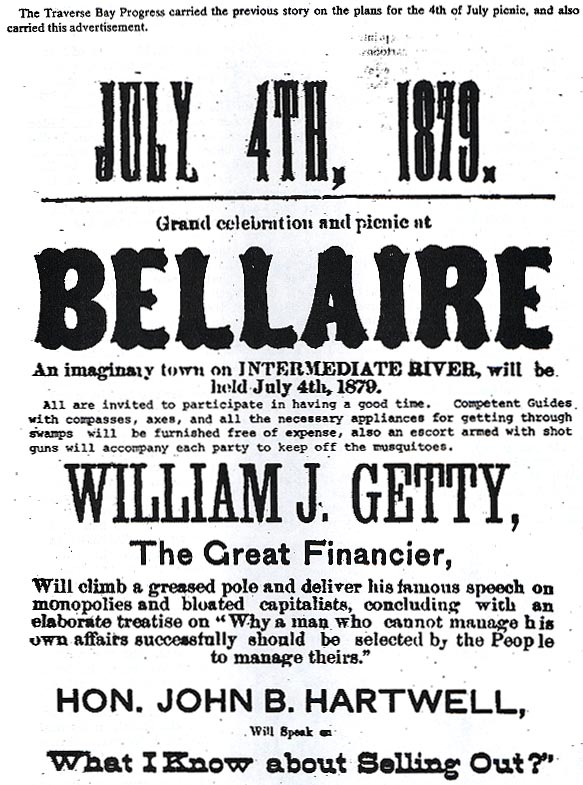
Addie was left alone at
the homestead many times while William was
off to Elk Rapids to pick up supplies which
he carried on his back over trails, and
later, by horse and buckboard. While he was
gone, Indians would come to
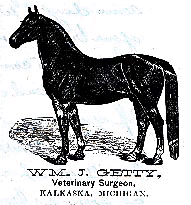 the cabin and
ask for bread and Addie was too scared to
say no to them, even though it was so hard
to bring flour in with which to make the
bread. The Indians would camp out front
until she made the bread and then they would
give her hides and other articles in
exchange for it.
the cabin and
ask for bread and Addie was too scared to
say no to them, even though it was so hard
to bring flour in with which to make the
bread. The Indians would camp out front
until she made the bread and then they would
give her hides and other articles in
exchange for it.
Sometimes, while William
was gone, Addie would go fishing and she
used a small lapel compass which William had
bought for her to find her way around. Later
on, after Addie had become accustomed to the
Indians, she would sometimes walk to their
camps to help out when one was ill. She used
this same compass to find her way back home.
About the only
playmates the children had were Indian kids,
and they all felt at ease with them. They
frequently went brook trout fishing with the
Indians to Cedar Creek.
William and Addie spent
several happy years in their log cabin on
their Forest Home homestead. It is said that
he planted the first apple orchard in Antrim
County, and it was cuttings from these trees
that formed the vast orchards in later
years. Lorena, William, Jr., Elizabeth and
Frances were all born while they lived here.
However, in 1883, since there were no
clearly defined schools in Antrim County,
they decided to move to Kalkaska County.
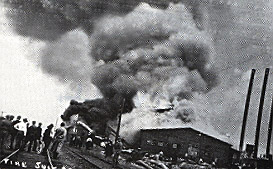 While the southern part
of the lower peninsula was developed fairly
early for farming, the northern part was
wild and it wasn't until the lumber barons
moved in that there was much activity. This
started in the early 1870's and the heyday
of pine logging was pretty well washed up by
1920. When the Chicago fire occurred in
October 1871, there was a mad rush for the
timber in the north part of the lower
peninsula. In time a large saw mill was set
up in the middle of a large tract of white
pine in the area now known as Kalkaska.
While the southern part
of the lower peninsula was developed fairly
early for farming, the northern part was
wild and it wasn't until the lumber barons
moved in that there was much activity. This
started in the early 1870's and the heyday
of pine logging was pretty well washed up by
1920. When the Chicago fire occurred in
October 1871, there was a mad rush for the
timber in the north part of the lower
peninsula. In time a large saw mill was set
up in the middle of a large tract of white
pine in the area now known as Kalkaska.
The
general rule, when logging ended, was that
the saw mill would mysteriously burn (for
insurance purposes), and that is
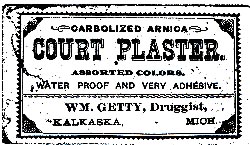 probably
what has happened in the picture below. You
will note there are still logs to be seen in
the yard but that was a setting that was used
to convince that arson was not involved. If
there was more timber available the mill
would have been rebuilt. Cut over lands were
let go for taxes and, for a few dollars,
anyone could get a quitclaim deed from "The
Company" for large acreages.
probably
what has happened in the picture below. You
will note there are still logs to be seen in
the yard but that was a setting that was used
to convince that arson was not involved. If
there was more timber available the mill
would have been rebuilt. Cut over lands were
let go for taxes and, for a few dollars,
anyone could get a quitclaim deed from "The
Company" for large acreages.
It is believed
William got some of his land in or near
Kalkaska in this manner. He was a horse
trader and knew opportunity when he saw it
and was able to pick up large tracts of land
from the timber companies after the pine
was cut, the first of
which was near the Boardman River just
south of town.
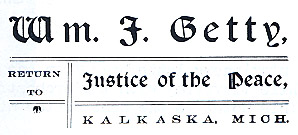 William managed to get
the Michigan Central Railroad to route
through Kalkaska by donating lands for
right of ways, station, yard, track, etc.
William managed to get
the Michigan Central Railroad to route
through Kalkaska by donating lands for
right of ways, station, yard, track, etc.
William purchased the
old Broomhead Livery Stable, which he
conducted for some time, and he continued to
follow his professions of veterinary surgeon
and dentist, blacksmith and farmer. He
owned a drugstore, and he served as
supervisor and justice of the peace for
several years.
 At one time he owned a
large chunk of Mackinaw City and the
surrounding area, including platted portions
of the city. He probably had a mind to make
a big killing on the properties in a short
time, but this never happened and he lost
the lands for nonpayment of taxes. After
William died in 1902 most of his holdings in
Kalkaska County were disposed of from time
to time to pay taxes, and for income.
At one time he owned a
large chunk of Mackinaw City and the
surrounding area, including platted portions
of the city. He probably had a mind to make
a big killing on the properties in a short
time, but this never happened and he lost
the lands for nonpayment of taxes. After
William died in 1902 most of his holdings in
Kalkaska County were disposed of from time
to time to pay taxes, and for income.
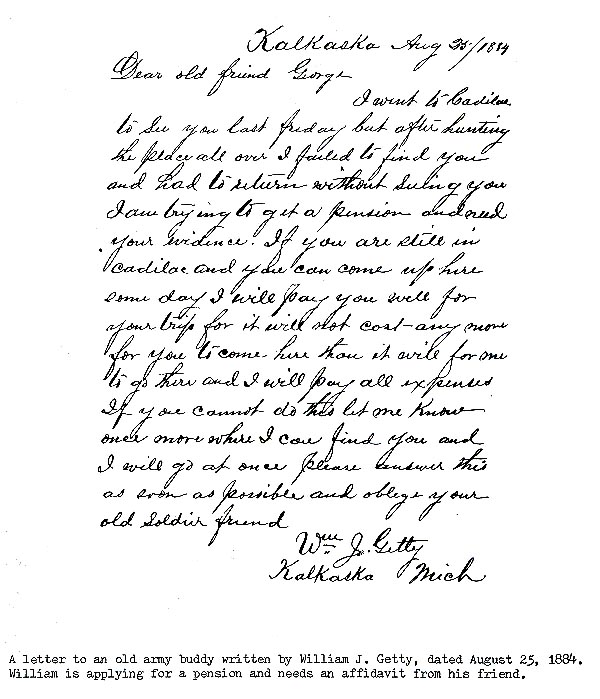
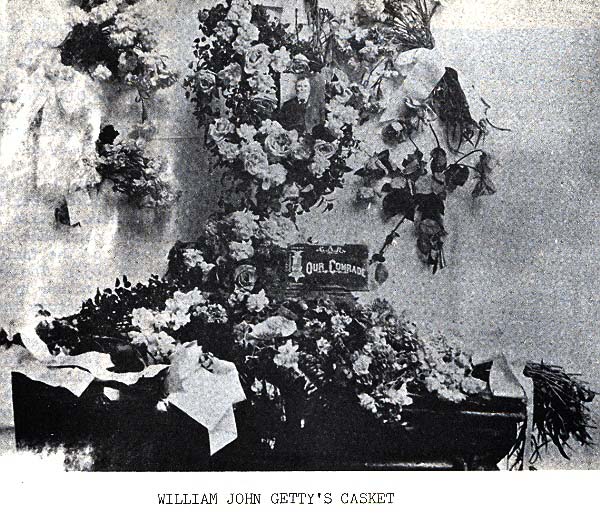
The following is an excerpt
taken from William's obituary which appeared in
The Kalkaskian: